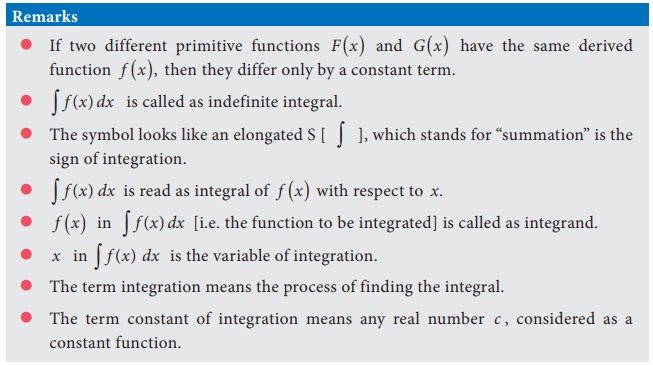Chapter: 12th Business Maths and Statistics : Chapter 2 : Integral Calculus - I
Concept of Indefinite Integral
Indefinite Integrals
Concept of Indefinite Integral
In differential calculus, we have learned how to calculate the
differential coefficient f ′ (x) of a given function f (x) with
respect to x. In this chapter, we have to find out the primitive
function f (x) (i.e. original function) whenever its derived
function f ′
(x) (i.e. derivative of a function) is given, such process is called
integration or anti differentiation.
∴ Integration is the
reverse process of differentiation
We know that d/dx (sin x ) = cos x. Here cos x
is known as Derived function, and sin x is known as Primitive function [also called as Anti
derivative function (or) Integral function].
Definition 2.1
A function F (x) is said to be a primitive
function of the derived function f (x) , if d/dx [ F (x)]= f (x)
Now, consider the following examples which are already known to
us.

From the above examples, we observe that 3x2 is
the derived function of the primitive functions x3 , x3
+ 5 , x3
– 3/2 , x 3
+ e , x3
− π , ... and
which indicates that the primitive functions are need not be unique, even
though the derived function is unique. So we come to a conclusion that x
3 + c is the
primitive function of the derived function 3x2 .
∴ For every derived
function, there are infinitely many primitives by choosing c arbitrarily
from the set of real numbers R. So we called these integrals as
indefinite integrals.

Definition 2.2
The process of determining an integral of a given function is
defined as integration of a function.

Related Topics